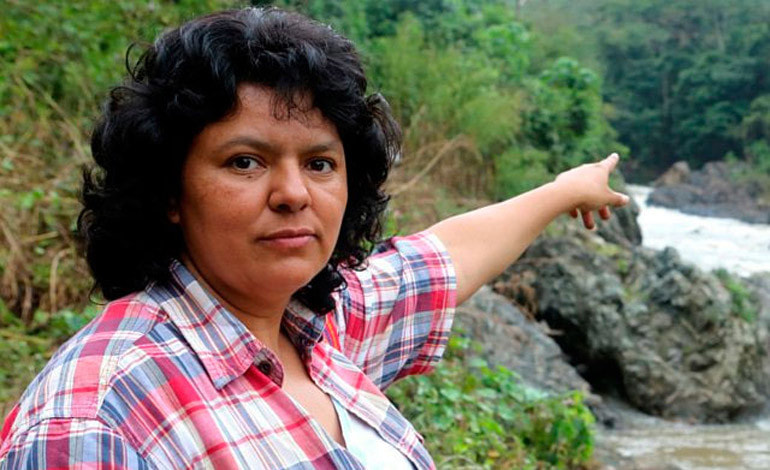|
Berta Cáceres is most known for her fight to stop the construction of a single dam in southwestern Honduras. This fight is emblematic of the larger struggle Berta devoted her life to, which she waged against a system of oppression made up of corrupt governmental institutions, US-backed security forces, and transnational corporations. Berta fought for environmental rights and the right to self-determination for her people, the indigenous Lenca, and for all the people of Honduras. Berta founded the organization COPINH, or the Council of Popular and Indigenous Organizations of Honduras, in 1993. COPINH’s purpose is to defend the Lenca people and the waterways and natural resources they depend on from destructive logging, mining and hydroelectric megaprojects, and from the military police that use repression and violence to defend these projects. Through COPINH, Berta revitalized the Lenca culture, and organized her people to protest against land grabs by logging and hydroelectric companies. The English version of COPINH’s website states, “We have stopped at least 50 logging projects that would have deforested our land and forests and 10 hydroelectric dams that threatened Lenca communities, including the huge Tigre Dam project on the border of Honduras and El Salvador.” Berta and other community members led COPINH in a blockade against the construction of the Agua Zarca dam, which would have polluted the waters of the Gualquarque River, seen as sacred by the Lenca. Combined government police and military forces used violence to attempt to silence the protestors, and in 2013, Tomas Garcia Dominguez, a leader of COPINH, was killed by a member of the government of Honduras. Nevertheless, Berta and COPINH persisted. The blockade was ultimately successful, and construction of the dam ceased once DESA, the Honduran corporation behind the dam, pulled out of its contract with the Honduran government. However, the threat to COPINH and its leaders only increased. Berta repeatedly received threatening text messages; she believed that her actions were being monitored and that she was at the top of the Honduran government’s hit list of activists. After going into hiding briefly in 2013, Berta said: “They follow me. They threaten to kill me, to kidnap me; they threaten my family. That is what we face.” Berta asked the government of Honduras for protection, but received essentially none. “She had filed 40 reports of threats against her. They knew she was under threat, but they failed to protect her,” said Berta’s mother, Austraberta Flores. In 2016, Berta was killed by six gunmen who had broken into her own home. Berta’s murder resembled an organized military operation, and in fact three of her assailants had ties to the Honduran military. One of these three had previous worked as head of security for DESA, and a fourth suspect was a manager of the dam project. Berta died at the hand of the same corrupt forces she lived to defeat, but her message and spirit are enduring. Even now, Berta’s face can be seen spray-painted on buildings in COPINH’s stronghold, the city of La Esperanza, with the words “Berta Vive!” spray-painted underneath. Berta’s family carries on her fight, both within Honduras and in the the United States, and during protests, organizers and activists continue to chant: “Berta didn’t die, she multiplied!” As I watched Berta Cáceres’ acceptance speech of the 2015 Goldman Environmental Prize, I was struck by the universality of her words. She spoke of the Lenca’s connection to the spirits that protect their rivers, and of the sacrifice made by the Lenca to protect the rivers, in turn protecting the well-being of humanity and of the planet. She spoke of the need to wake up, to shake ourselves free of the shackles of capitalism, material greed, racism, and patriarchy, in order to prevent us from destroying ourselves. Berta’s message is the one that we need to listen to if we are to reclaim our world from the forces that threaten to destroy it—if we are to create a world that preserves indigenous cultures and the environment instead of corporate profit and violence. If you’re interested in getting a more in-depth look at Berta’s life and the circumstances surrounding her death, the following films are great resources: Written by Sam BottmanAbout me: My name is Sam Bottman. I started volunteering at Whatcom Peace & Justice Center in May 2018 after hearing about the organization online and getting excited about its mission. I’ve been interested in learning about US foreign policy for a while, and the true motivations behind the United States’ involvement in the government of Honduras and those of other countries. Through volunteering with WPJC, I hope to spread awareness of the injustices that my country is implicated in and join alongside those organizations and individuals who are fighting to end them. Comments are closed.
|
Contributors
We invite the WPJC community to contribute fact-checked submissions on local, national and global current events. Linking to original sources and articles is required. Submissions may be sent to [email protected] for review. Categories
All
Archives
May 2024
|


 RSS Feed
RSS Feed